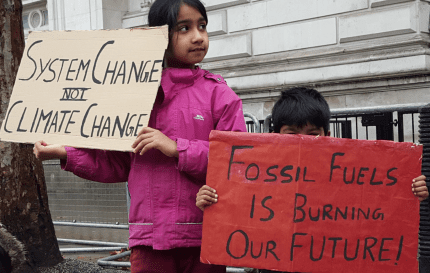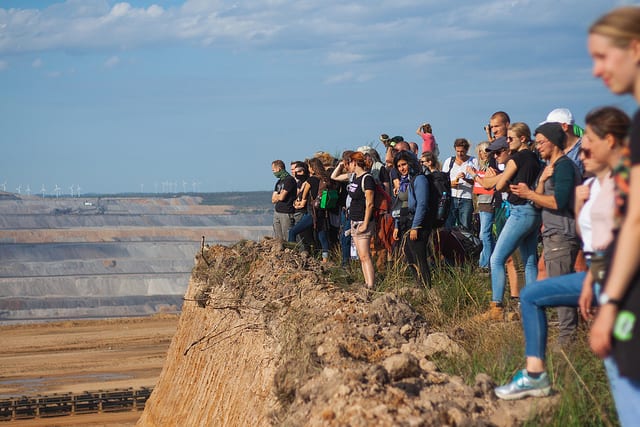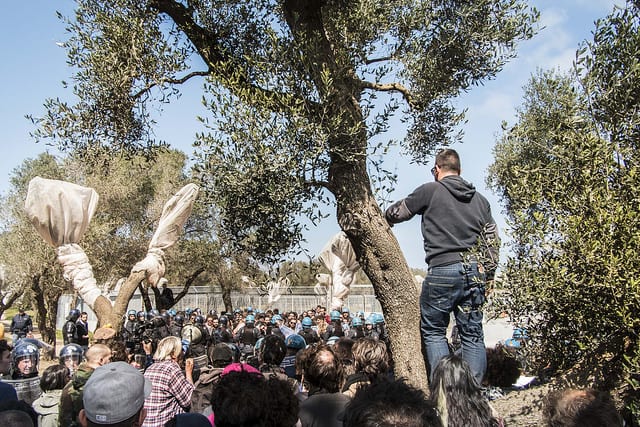
Today, thousands of German students are striking across at least fourteen cities as part of a global climate strike, they are demanding that their government initiate an immediate coal phase-out and ramp up action to tackle climate change. At the same time striking Polish students have entered the UN climate negotiations in Katowice to raise the pressure on governments entering the final day of crunch talks where big polluters have been trying to water down the established facts on global warming and propose false solutions to the climate crisis. These strike actions are inspired by those of Swedish student Greta Thunberg and the thousands of students across Australia, USA, and Canada who see that their future is threatened by climate chaos and aren’t willing to stand by and surrender the fate of their generation to today’s politicians and fossil fuel executives.
“We, young people in particular, must now stand up for climate justice. We are the last generation who still have the opportunity to prevent the most catastrophic consequences of climate change. So now is the time to take to the streets. The climate won’t wait for our graduation.” – Linus Steinmetz, 15-year-old pupil from Göttingen.
The recent findings released by the IPCC in October say in no uncertain terms that in order to stay below 1.5°C and avoid the worst impacts of climate change we must take immediate action to stop all new fossil fuel projects and finance to the industry while delivering a rapid transition rapidly to 100% renewable and socially just energy for all. Our governments, at the UN climate summit in Poland, may be dragging their heels and in some cases actively trying to derail the process but it is increasingly clear that the urgency of the situation is resonating with more and more communities, and in the absence of political leadership they are ready to take matters into their own hands.

People in action to save Hambach Forest from destructive coal mining in Germany. Credit: Leon Enrique
Across Europe, people are coming together to resist dangerous fossil fuel projects. Anti-coal protesters occupying the pristine Hambach Forest in Germany have, so far, managed to halt plans to expand the nearby lignite mine (Europe’s largest single source of carbon emissions) by literally putting their bodies on the line to halt construction efforts. The project would destroy this ancient woodland and totally undermine German climate commitments. In the UK local groups are bolstering their campaigns to halt fracking, where drilling started for the first time in Lancashire this year. The communities in the vicinity are spurred on by the climate, health and safety implications of the extraction process and are willing to blockade the drill sites in order to protect themselves and their families from them – despite the disproportionate legal response from authorities, they plan to continue to do so.
From Greece to Italy people are rising up to halt the construction of the Southern Gas Corridor, a carbon bomb designed to carry fossil gas from the Caspian Sea to southern Europe. The construction of the pipeline is well underway and has sparked ongoing protests from farmers, local governments, and communities who have suffered through construction and are still fighting to avoid further destruction of local land and prevent the operation of the pipeline. They are doing this in the face of intimidation and often violent tactics employed by the pipeline consortium and national governments. Farmers in Greece have been branded as ‘backwards’ for rejecting pipeline consortiums claims that the project is a money tree, while in Southern Italy the community of Melendugno was practically put under siege by riot police, with people unable to walk the streets, when the community tried to prevent the destruction of its ancient olive groves lying in the pathway of construction.

A community rallies to save their olive groves from a fossil gas pipeline in Italy. Credit: Alessandra Tommasi
The rise of right-wing populist governments, from Bolsonaro and Trump in the Americas to Duda and the Five Star movement here in Europe, has paved the way for regressive government-level policies both on climate action and space for civil society to engage in decision-making that profoundly affects our common future, our common home. This is a challenge that the climate movement is resilient enough to overcome and in many ways the fight to reclaim the power of energy production and localise the economic power in the name of climate justice is a strong tonic against the divisiveness of populism. Take, for example, the first ever climate camp organised in Poland this year which kick-started a campaign that brings together people from different movements – abortion rights, anti-fascist, anti-coal, forest protectors – with the locals in Konin opposing lignite mining in the region.
People are, in increasing numbers, more and more willing to put their personal liberty on the line to demand appropriate action on climate change, the Extinction Rebellion actions are one example of this. The actions of the ‘gilets jaunes’ or yellow vests in France shows that people are willing to fight back when the financial elite try to impose the costs of ecological transition on to the poor. Despite the challenging prevailing political climate justice movement in Europe, and around the world, has never been stronger. With new ideas and organising structures popping up and being driven by new people the outlook for 2019, while still unclear, feels full of momentum and with it the potential to be a tipping point for the movement. It can’t come quickly enough.